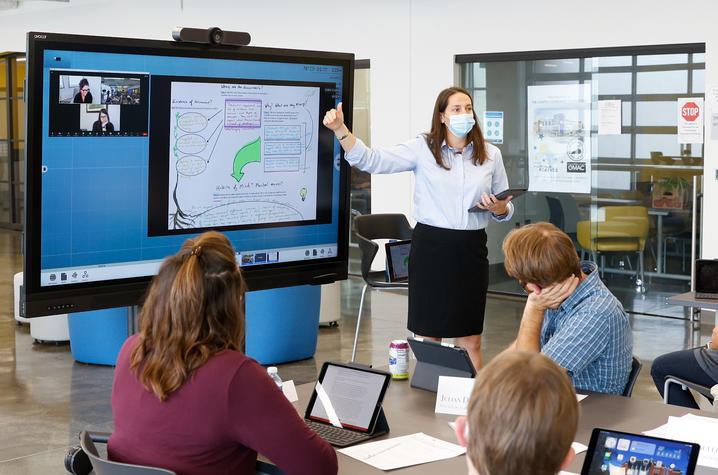CELT Announces 2022-23 Faculty Cohort for Teaching Innovation Institute
LEXINGTON, Ky. (June 27, 2022) — For the past two years, innovation has taken on new urgency as we take stock of how the landscape of higher education has permanently changed in the wake of a global pandemic. The conversation about teaching and learning has never been more robust in light of the challenges we face, and it calls us to reexamine not only how we approach our programs, courses and students, but also how we understand innovation itself as it relates to how and what we teach.
The Center for the Enhancement of Learning and Teaching (CELT) launched the Teaching Innovation Institute in 2020 as an incubator for cutting-edge instructional techniques and a transdisciplinary space for faculty to build community, engage with shared challenges and opportunities and experiment with pedagogical approaches. Two faculty cohorts have completed the program with a third on the way for the next academic year. All in all, the three cohorts have involved 61 faculty from 14 colleges and 46 departments or schools.
“Some of the most valuable takeaways from the Institute are the relationships faculty develop with others across campus. They are able to share teaching expertise from their own disciplines while investigating new pedagogical ideas to find what works for them and their students,” said Jill Abney, Ph.D., senior faculty/instructional consultant at CELT and coordinator for the Teaching Innovation Institute.
“The Institute is rooted in theoretical and evidence-based frameworks of inclusive and digital pedagogies, while the cross-disciplinary opportunities for reflective practice help faculty see their teaching, students, and disciplines in a new light. What’s more, they grow in their capacity as teacher-leaders and share their insights with others at UK and beyond,” said Trey Conatser, acting director of CELT.
In addition to announcing the incoming cohort for the Teaching Innovation Institute, CELT has also released the third volume of Greater Faculties: A Review of Teaching and Learning, which features insights and reflections from the first Institute cohort. These short essays document the faculty’s experiences during the Institute and share perspectives and practices they’ve implemented in their teaching. The following video describes the work of the Institute in the words of its second cohort.
As the needs of our students and the circumstances of our classrooms continue to evolve, spaces of intentional and collaborative reflection remain vital to our teaching mission at the University of Kentucky.
CELT is excited to announce the 2022 cohort of the Teaching Innovation Institute:
- Stefan Bird-Pollen, Department of Philosophy
- Eladio Bobadilla, Department of History
- Anna Bosch, Department of Linguistics
- Nicole Breazeale, Department of Community and Leadership Development
- Brenna Byrd, Department of Modern and Classical Languages, Literatures, and Cultures
- Renee Bonzani, Department of Anthropology
- Thomas Cochell, Department of Chemical and Materials Engineering
- Sarah Cprek, Department of Health, Behavior, and Society
- Brad Elliot, Department of Mathematics
- April Hatcher, Department of Neuroscience
- Ketrell McWhorter, Department of Epidemiology and Environmental Health
- Zitsi Mirakhur, Department of Educational Policy and Evaluation
- Kathryn Mullen, Department of Arts Administration
- Thamer Musbah, Department of Oral Health Practice
- Denise O’Dell, Department of Physical Therapy
- Erin Richard, Department of Biology
- Elizabeth Spencer, Department of Integrated Strategic Communication
- Helen Turner, School of Interiors
- Kristine Urschel, Department of Animal and Food Sciences
- Jessalyn Vallade, School of Information Science

As the state’s flagship, land-grant institution, the University of Kentucky exists to advance the Commonwealth. We do that by preparing the next generation of leaders — placing students at the heart of everything we do — and transforming the lives of Kentuckians through education, research and creative work, service and health care. We pride ourselves on being a catalyst for breakthroughs and a force for healing, a place where ingenuity unfolds. It's all made possible by our people — visionaries, disruptors and pioneers — who make up 200 academic programs, a $476.5 million research and development enterprise and a world-class medical center, all on one campus.




